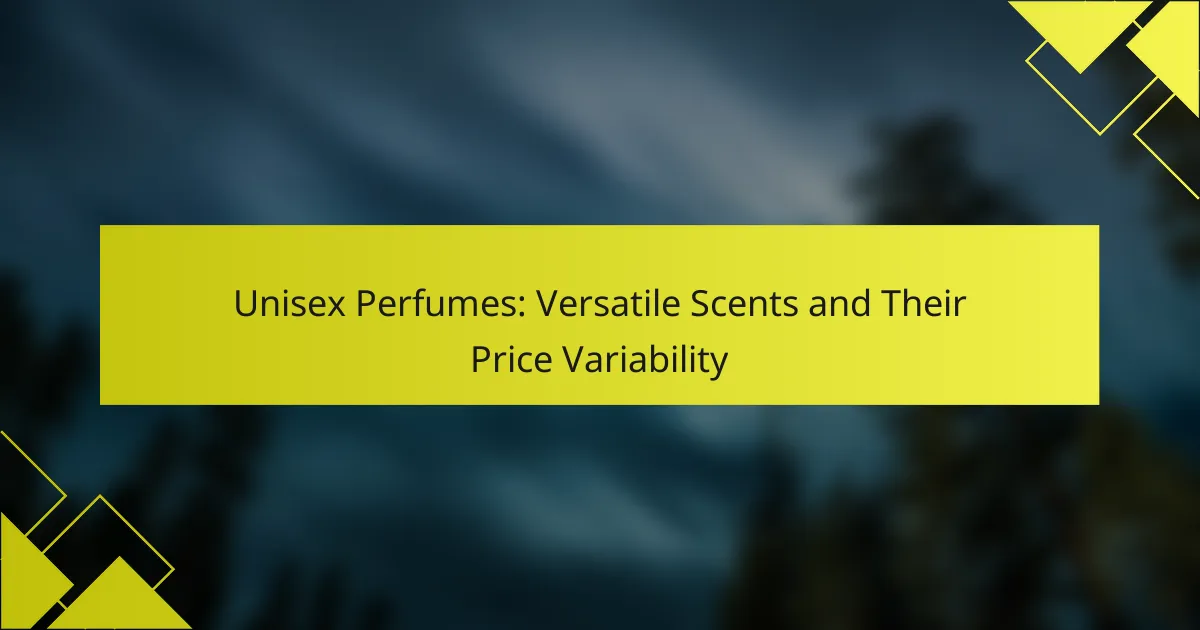
What are Niche Perfumes?
Niche perfumes are unique fragrances created by smaller, independent brands. They focus on artistry and quality over mass-market appeal. These perfumes often feature rare ingredients and innovative compositions. Unlike designer perfumes, niche options prioritize individuality and craftsmanship. Many niche brands produce limited quantities, enhancing their exclusivity. For example, brands like Amouage and Serge Lutens exemplify this approach. Niche perfumes often come with higher price points due to their distinctiveness and quality. This market segment appeals to consumers seeking personalized scent experiences.
How do Niche Perfumes differ from Designer Fragrances?
Niche perfumes differ from designer fragrances primarily in their production scale and target market. Niche perfumes are crafted in smaller batches, often by independent brands. They focus on unique, artistic compositions and may use rare ingredients. In contrast, designer fragrances are produced by well-known fashion brands and aim for mass appeal. They often feature more conventional scent profiles. The niche market emphasizes individuality and exclusivity, while designer fragrances prioritize brand recognition and accessibility. This distinction influences pricing, with niche perfumes typically being more expensive due to their artisanal nature.
What characteristics define a Niche Perfume?
Niche perfumes are characterized by their exclusivity and unique scent profiles. They often feature high-quality ingredients that are not commonly used in mass-market fragrances. Niche perfumes typically have a limited production run, enhancing their rarity. They are usually created by independent perfumers or small brands, focusing on artistry rather than commercial appeal. The scent compositions are often complex and layered, providing a distinctive olfactory experience. Additionally, niche perfumes tend to have a higher price point due to their craftsmanship and premium materials. This segment of the fragrance market appeals to consumers seeking individuality and personal expression.
Why are Niche Perfumes often considered more exclusive?
Niche perfumes are often considered more exclusive due to their limited production and unique formulations. These fragrances are typically crafted by independent brands that prioritize artistry over mass-market appeal. Niche perfumers often use rare ingredients that are not commonly found in mainstream fragrances. This results in distinct scents that appeal to a select audience. Additionally, niche perfumes are usually produced in smaller batches, enhancing their rarity. The exclusivity is further emphasized by higher price points, reflecting the quality and craftsmanship involved. Many consumers seek niche perfumes for their individuality and to stand out from mainstream scents. Consequently, niche perfumes foster a sense of uniqueness and personal expression.
What makes Niche Perfumes unique?
Niche perfumes are unique due to their exclusive formulations and artistry. They often feature rare ingredients not commonly found in mainstream fragrances. This results in distinctive scent profiles that appeal to a specific audience. Niche brands focus on quality over quantity, producing limited batches. The craftsmanship involved often includes intricate blending techniques. Many niche perfumes are inspired by art, culture, or personal stories. This emotional connection enhances their uniqueness. Additionally, niche perfumes typically have higher concentrations of fragrance oils, leading to longer-lasting scents.
How do the ingredients in Niche Perfumes contribute to their uniqueness?
The ingredients in niche perfumes contribute to their uniqueness through the use of rare and high-quality materials. Niche perfumes often incorporate uncommon botanical extracts, essential oils, and synthetic aroma compounds. These ingredients are selected for their distinctive scents and complex profiles. Many niche brands prioritize artisanal crafting methods, enhancing the overall fragrance experience. The sourcing of ingredients from specific regions adds to the character of the scent. For example, certain flowers or spices may only be found in particular climates, influencing the perfume’s uniqueness. Additionally, the concentration of fragrance oils in niche perfumes is typically higher, resulting in a more intense and lasting scent. This careful selection and formulation process distinguishes niche perfumes from mass-market options.
What role does craftsmanship play in the creation of Niche Perfumes?
Craftsmanship is essential in the creation of niche perfumes. It involves meticulous attention to detail in every step of the fragrance development process. Skilled artisans blend high-quality ingredients to create unique scent profiles. This expertise ensures that each perfume tells a distinct story through its aroma. Craftsmanship also influences the sourcing of rare and natural materials, enhancing the perfume’s complexity. The artistic vision of the perfumer shapes the final product, making it a work of art. Furthermore, the craftsmanship involved often justifies the higher price point of niche perfumes. This dedication to quality and individuality sets niche perfumes apart from mass-produced fragrances.
What are the benefits of choosing Niche Perfumes?
Niche perfumes offer unique scents that distinguish them from mass-produced fragrances. These perfumes often contain high-quality ingredients, enhancing their overall scent profile. Many niche brands focus on artistry and craftsmanship, resulting in complex and layered fragrances. Niche perfumes typically have a lower production volume, making them more exclusive. This exclusivity appeals to consumers seeking individuality in their fragrance choices. Additionally, niche perfumes often provide a longer-lasting scent due to their concentrated formulations. The growing popularity of niche perfumes reflects a shift towards personalized and unique fragrance experiences.
How do Niche Perfumes enhance personal expression?
Niche perfumes enhance personal expression by offering unique and distinctive scents that reflect individual identity. These fragrances are often crafted in smaller batches, ensuring exclusivity. This exclusivity allows wearers to stand out in a crowd. Niche perfumes typically feature complex compositions, which can evoke specific emotions or memories. For example, a scent might remind someone of a cherished place or person. The artistry behind niche perfumes often emphasizes creativity and originality. This creativity resonates with those seeking to express their personality through fragrance. Additionally, niche brands often focus on storytelling, adding depth to the scent experience. Thus, niche perfumes enable individuals to convey their unique essence and personal narratives through olfactory means.
What emotional connections can Niche Perfumes create?
Niche perfumes can create deep emotional connections by evoking memories and personal experiences. The unique scents often resonate with individual identities and preferences. This personalization fosters a sense of belonging and self-expression. Niche perfumes frequently utilize rare ingredients that add to their distinctiveness. This rarity can evoke feelings of exclusivity and luxury. Research indicates that scent is closely tied to memory recall, enhancing emotional responses. For instance, a specific fragrance may remind someone of a loved one or a significant life event. Overall, niche perfumes serve as powerful tools for emotional engagement and self-identity.

What are the price ranges of Niche Perfumes?
Niche perfumes typically range from $100 to $500 per bottle. Some exclusive brands may charge upwards of $1,000. The price reflects the quality of ingredients and craftsmanship. Many niche perfumes use rare and natural materials. This contrasts with mass-market fragrances, which are often less expensive. The unique scent profiles contribute to their higher cost. Limited editions or artisan creations can further increase prices. Overall, niche perfumes represent a luxury market segment.
How do price ranges vary among different Niche Perfume brands?
Price ranges among different niche perfume brands vary significantly. Typically, niche perfumes range from $100 to $500 per bottle. Some exclusive brands may charge upwards of $1,000 for limited editions. The variation in price is influenced by factors such as the quality of ingredients and the brand’s heritage. For example, brands like Amouage often fall on the higher end due to their luxurious compositions. In contrast, brands like Diptyque may offer more affordable options starting around $100. Additionally, the rarity of specific scents can drive prices higher. Overall, niche perfume pricing reflects both craftsmanship and brand positioning in the market.
What factors influence the pricing of Niche Perfumes?
The pricing of niche perfumes is influenced by several key factors. Firstly, ingredient quality plays a significant role. Niche perfumes often use rare, high-quality materials, which increases production costs. Secondly, brand reputation affects pricing. Established niche brands can command higher prices due to their perceived value. Thirdly, packaging and presentation contribute to costs. Luxurious packaging can enhance the overall appeal and justify higher prices. Additionally, production scale impacts pricing. Smaller production runs may lead to higher prices due to limited availability. Finally, marketing strategies can influence perception and demand, affecting pricing. These factors collectively determine the final retail price of niche perfumes.
How does the packaging affect the price of Niche Perfumes?
Packaging significantly affects the price of niche perfumes. High-quality packaging materials increase production costs. Unique designs and elaborate bottles enhance perceived value. Custom packaging often involves artisanal craftsmanship. This craftsmanship adds to the overall price. Additionally, sustainable or eco-friendly packaging can demand higher prices. Consumers often associate premium packaging with luxury and exclusivity. Studies show that attractive packaging can influence purchasing decisions, justifying higher price points.
What are some examples of Niche Perfumes at various price points?
Examples of niche perfumes at various price points include Amouage Reflection Man priced around $300, Maison Francis Kurkdjian Baccarat Rouge 540 at approximately $300, and Byredo Gypsy Water for about $200. At lower price points, there are options like Diptyque Philosykos for around $140 and Le Labo Santal 33 priced at approximately $192. These prices reflect the unique qualities and craftsmanship associated with niche fragrances. Niche perfumes often use high-quality ingredients, resulting in distinctive scents that are less common in mainstream fragrances.
Which Niche Perfumes are considered luxury items?
Niche perfumes considered luxury items include brands like Amouage, Creed, and Maison Francis Kurkdjian. Amouage is known for its opulent ingredients and unique compositions. Creed offers fragrances like Aventus, celebrated for its rich history and quality. Maison Francis Kurkdjian is renowned for its artistry and sophisticated scents. These brands typically price their products above mainstream perfumes, often exceeding $200 per bottle. Their exclusivity and craftsmanship contribute to their luxury status in the fragrance market.
What affordable options exist within the Niche Perfume market?
Affordable options within the niche perfume market include brands like Montale, L’Artisan Parfumeur, and Diptyque. Montale offers fragrances starting around $50 for smaller sizes. L’Artisan Parfumeur has options available for approximately $70. Diptyque features scents that can be found for about $75. These brands maintain quality while providing more accessible pricing. Many niche perfumes are available in travel sizes, which can further reduce costs. This allows consumers to explore unique scents without a significant financial commitment.

How can I choose the right Niche Perfume for myself?
To choose the right niche perfume for yourself, start by identifying your scent preferences. Consider the fragrance families such as floral, woody, oriental, or fresh. Test various scents to see which notes resonate with you. Pay attention to how each perfume evolves on your skin over time. Evaluate the longevity and sillage of the fragrance, as these can affect your overall experience. Research the brand’s reputation and the quality of ingredients used. Reading reviews can provide insights into others’ experiences with specific perfumes. Ultimately, select a fragrance that feels personal and aligns with your identity.
What should I consider when selecting a Niche Perfume?
When selecting a niche perfume, consider the fragrance profile, which includes notes and overall scent composition. Evaluate your personal preferences for floral, woody, or oriental scents. Test the perfume on your skin to see how it interacts with your body chemistry. Consider the concentration of the fragrance, such as eau de parfum or extrait de parfum, as this affects longevity and intensity. Research the brand’s reputation for quality and craftsmanship. Look into the price range, as niche perfumes often carry a premium due to unique ingredients. Lastly, consider the occasion for which you are purchasing the perfume to ensure it aligns with your intended use.
How do my personal preferences influence my choice of Niche Perfume?
Personal preferences significantly influence the choice of niche perfume. These preferences include scent family, intensity, and occasion suitability. For instance, someone who enjoys floral scents may gravitate towards niche perfumes that emphasize rose or jasmine. Additionally, personal values such as sustainability can steer choices towards brands that prioritize eco-friendly practices.
Moreover, an individual’s lifestyle impacts their selection. A person with an active lifestyle might prefer lighter, fresher fragrances, while someone in a formal setting may choose richer, more complex scents. Preferences can also be shaped by past experiences and emotional connections to specific aromas.
Research indicates that fragrance preferences are often linked to personality traits. A study by the Journal of Experimental Psychology found that individuals with certain personality types gravitate towards specific scent profiles. This highlights how personal identity and scent preferences intersect in the realm of niche perfumes.
What are the best ways to test Niche Perfumes before buying?
The best ways to test niche perfumes before buying include sampling at boutiques, using testers, and attending fragrance events. Sampling at boutiques allows you to experience the scent in a retail environment. Testers are often available for direct application on skin or scent strips. Applying the perfume to your skin helps you assess how it interacts with your body chemistry. Attending fragrance events provides opportunities to explore various niche brands and their offerings. Additionally, reading reviews and watching video demonstrations can offer insights into the scent profile and longevity. These methods ensure a comprehensive evaluation of niche perfumes before making a purchase.
What tips can help me make the most of my Niche Perfume purchase?
To make the most of your niche perfume purchase, consider testing the fragrance on your skin before buying. Niche perfumes often contain unique ingredients that can react differently with individual skin chemistry. Apply a small amount to your wrist and wait for at least 30 minutes to observe how the scent evolves. This allows you to experience the top, middle, and base notes fully.
Additionally, research the brand and its story. Understanding the craftsmanship and inspiration behind a niche perfume can enhance your appreciation of it. Look for reviews and feedback from other users to gauge longevity and sillage.
Finally, store your perfume properly. Keep it in a cool, dark place to preserve its integrity. Niche perfumes are often more concentrated than mass-market options, so a little goes a long way. These practices ensure you enjoy your purchase to its fullest potential.
How should I store my Niche Perfume to maintain its quality?
Store niche perfume in a cool, dark place to maintain its quality. Avoid exposure to direct sunlight, heat, and humidity. These factors can degrade the fragrance over time. Use the original box or a dark container for added protection. Ensure the cap is tightly sealed to prevent evaporation. Proper storage can extend the perfume’s lifespan and preserve its unique scent profile.
What is the best way to apply Niche Perfume for longevity?
The best way to apply niche perfume for longevity is to spray it on pulse points. Pulse points include areas like the wrists, neck, and behind the ears. These areas emit heat, which helps to diffuse the fragrance throughout the day. Additionally, applying perfume after a shower can enhance its longevity. This is because clean skin retains scent better due to moisture. It is also effective to layer with unscented lotion before applying perfume. This helps to create a base that holds the fragrance. Avoid rubbing the wrists together after application, as this can break down the scent molecules. Instead, let the perfume dry naturally on the skin.
Niche perfumes are unique fragrances produced by independent brands, emphasizing artistry and quality over mass-market appeal. This article explores the characteristics that define niche perfumes, their differences from designer fragrances, and the factors contributing to their exclusivity and higher price points. It also highlights the emotional connections these scents can create and provides guidance on selecting the right niche perfume while considering personal preferences and proper storage techniques. Additionally, the article outlines price ranges for niche perfumes, showcasing examples across various price points and discussing affordable options within the niche market.



